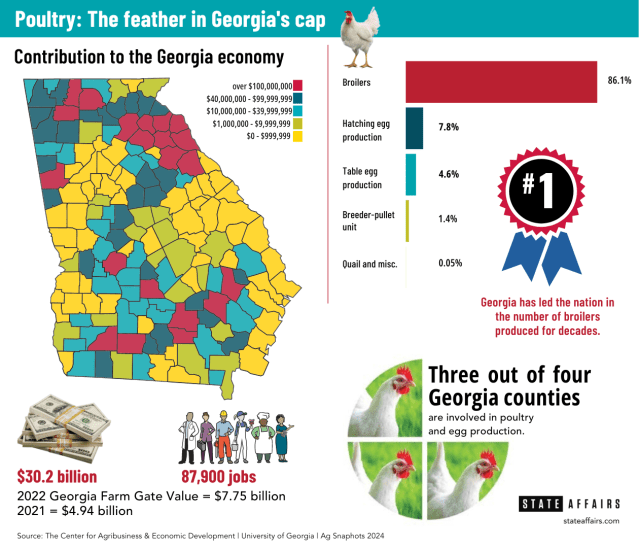Stay ahead of the curve as a political insider with deep policy analysis, daily briefings and policy-shaping tools.
Request a DemoAmericus Mayor Lee Kinnamon on Jimmy Carter: ‘… a giant man, who never lost his connection to this little place’

Mayor of Americus Lee Kinnamon
Lee Kinnamon, the 59-year-old mayor of Americus and a sixth-generation resident of Sumter County, sat down with State Affairs this week to discuss former President Jimmy Carter’s impact on Americus, a small, rural town in southwest-central Georgia with a population just shy of 16,000, Carter’s hometown of Plains, and the former president’s wider contributions to the county and state.
Americus, just 10 miles north of Plains, is the birthplace and headquarters of Habitat for Humanity, the nonprofit that works with volunteers and would-be homeowners to build affordable homes around the world. Jimmy and Rosalynn Carter spent one week a year for almost 40 years swinging hammers for Habitat, building and repairing thousands of homes, and bringing precious publicity to a cause near and dear to their hearts.
The conversation has been edited for brevity and clarity.
Q. What are some of the key ways that President Carter has been able to impact Americus, Plains and Sumter County throughout his life?
A. Well, since he returned to Sumter County from the White House he has been an unflagging supporter of his hometown’s and the county’s economic development, and a supporter of public education in the county. He’s a strong supporter of Georgia Southwestern [University], where he got to know his wife, Mrs. Rosalynn. And he has supported projects in Americus, such as the Rylander Theater. Of course, his and Rosalynn’s support for Habitat for Humanity, which was founded here by Millard and Linda Fuller, has been enormous. And they were all friends. Not only did they work together on these homebuilding projects around the country and around the world, but they were good friends. And so he was closely tied to what was going on here in the years following his presidency.
Q. Talk about that a little bit more, because most people know that he and Rosalynn volunteered with Habitat for Humanity. And because of their prominence, they brought a lot more attention to it. But how did that involvement begin and evolve?
A. President Carter grew up here [in Sumter County] on what was a fairly typical farm and, if you've read his book, "An Hour Before Daylight," you get a glimpse into that world where African-Americans who worked [as sharecroppers] on the farm, and he and his father's and mother's siblings, they all were integrated in a way on the farm that allowed them to work with each other. They were segregated, of course, and separated by the conventions and rules of that period. And that informed his development significantly.
So that by the time he became our governor, and gave that famous quotation from the gubernatorial inaugural address in January of 1971, he had traveled a good way along an arc that began in his childhood. [At his inauguration, Carter said, “I say to you quite frankly that the time for racial discrimination is over. … No poor, rural, weak or Black person should ever have to bear the additional burden of being deprived of the opportunity of an education, a job or simple justice.”]
He was talking about an end to segregation and end to discrimination and a call for equality. It's a watershed moment in the state's history. Prior to that, we had not heard a governor say those words. And we had not heard him say those words. And I think that's the moment that history will remember. Because Jimmy Carter had been elected under the assumption that he would be a sort of business-as-usual, conservative white governor, in the vein of Lester Maddox. [Segregationist former Georgia Governor] Marvin Griffin had endorsed him [Carter]. When he made that statement, he shocked some, but confirmed for others what they had long suspected: that he was really a progressive. And people who knew him well knew that he was going to change the state forever. And from that moment forward, he devoted really his entire life to living out those words.

Q. The evolution of his public positions on race is interesting. When he was on the school board in the 1950s, he basically toed the line as far as segregation goes.
A. Well, you know, I suppose the time was not right for that change to happen. But what allowed him to stand and make those statements at his inauguration were all of the heroic actions of African Americans and whites during the civil rights movement in the prior decades, in the ‘50s and the ‘60s. And it's not as though he had not been evolving, really, from his childhood, and his intimate relationships with African-Americans on the farm. He had the example of Mrs. Lillian, his mother, who had a much more progressive, forward-thinking view on matters of race than certainly most people of her station here in those years.
Q. There was a period in the late-1950s when Carter was pressured to join the White Citizens Council in Plains. And he said he wouldn't, and his peanut warehouse and dry goods store were boycotted.
A. President Carter is never one to be bullied. We also have to remember even when he was campaigning for governor, on the position of federally enforced busing, he stood against that and said that he did not believe that was the solution. And part of that was the fact that he just was not going to be bullied.
So now in terms of my personal experience with him —I was speaking as a historian, because I was born in 1964, the year of the Civil Rights Act. So you know, I turned seven in 1971. I don’t remember the assassination of Dr. King, right? But turning to what I do know of him [Carter] on a personal level, when he was campaigning for president, and when he ultimately won the election and went into the White House, I was 11, 12, 13 years old. Those are really strong memories for me.
Q. What do you remember?
A. Just the incredible flood of people into this sleepy place. Plains was transformed. And we would ride over there from Americus, my cousin and my sister and I. We would go over and gawk at all of the goings-on and kind of marvel that [ABC news reporter] Sam Donaldson would be at the depot in Plains, interviewing Mrs. Lillian. And yeah, I remember the pride, too, that we, me and my parents, felt of having a president from this place was overwhelming. I remember my grandmother having campaign buttons, and all the posters and paraphernalia and things for Carter. And she was very interested and very, very proud of that. Now, I'm talking about a woman who was born in 1894. She lived to be 97.
Much later in life, I got to know President Carter and Mrs. Rosalynn in a civic capacity. They were both involved in driving the economic development to ensure the continued good fortune of their hometown, Plains, which they dearly loved.
So in the late-‘90s, Mrs. Rosalynn and Mr. Jimmy, in order to accomplish this, one thing that they thought would help would be to take the railroad line that runs into their town and create a passenger excursion train for tourists. And they became involved in that, and I was named to the board of the Southwest Georgia Railroad Excursion Authority, which was created by the Georgia General Assembly. President Carter had his hand in, kind of pushing that forward to get it funded and to get it created. …President Carter worked very closely with [local legislators] to make sure it happened. And then I began to get to know President Carter and have interactions with him. … I was made chair and I've served ever since, for about 20 years, as the chairman of the railroad authority.
Q. And what does that railroad do for not just Plains, but for the whole area?
A. Millions of dollars in economic uplift every year for this relatively poor area. At least $2 million in direct economic impact from the train, and then of course a big multiplier effect from all the related tourism.
The train begins near Cordele, where we're headquartered, and then it takes passengers from there across the heart of Sumter County, crossing Lake Blackshear and the Flint River. Then it terminates at Archery, which is [Carter’s] boyhood farm. And we bring thousands of people annually. Several hundred on each trip come into Plains every Saturday. And we’ve all benefited. Because when it lays over here in Americus, we have people staying in our hotels and our restaurants. … And our business owners know the excursion train is deeply tied to their fortunes.
And I have to give President Carter and Mrs. Rosalynn their due for this. They were just absolutely determined to get that train off the ground. It took a lot of people, but without the clout offered by the Carters, we probably wouldn’t be here today talking about it.
And the Carters have stuck with it. We lost all state funding for the train during the great recession. And we were cut completely out of the state budget. And just in the last several years, President Carter has helped to advocate for restoring funding to the train, helping us to navigate politics and the budget process and all of that with people he knows, and it has been bipartisan. [Representative] Butch Parrish, a Republican, really helped with that. It has not been, you know, ‘Well, that train was for President Carter and his Democrat cronies.’ It's a train that helps a poor part of the state just get a little bit better. It helps a lot of folks, it provides employment, it's an economic engine.
Q. What is the budget for the train?
A. It's just shy of $700,000. And you know, sometimes [Carter] would ask me hard questions about what we're doing and what the numbers are looking like. Because when I would meet with him, he’s the chief executive, in every sense of the word, and he would ask all the difficult questions.
… And not all people who leave that [presidential] office are as connected and invested and rooted in their home place as President Carter is. He has just done so much to improve conditions here.
Q. Carter devoted a lot of acreage from a former peanut and soybean tract on his farm to create a giant solar energy field that now powers 50% of Plains. And now we have all of these green energy industries, including solar energy companies, coming to Georgia.
A. Well, he was the alternative energy president. He was the one who pioneered that, making the White House energy efficient and so forth. He was way ahead of his time on that, though, and he was criticized for it at the time. The Austerity President, right? And there was a big economic development announcement in the governor’s office recently about a solar panel company coming to Americus. NanoPV is the name of the company… We hope that materializes. If it does it could be an enormous economic uplift.
Q. We understand that over these last couple of years, the Carters are still working on a fair housing initiative through the Carter Plains Foundation to delve into some heirs property issues with a number of low-income, predominantly African American folks in Plains who don't have clear titles to their homes, which are falling into disrepair. And they’re helping to repair the homes and work out the legal issues.
A. Yes, those properties are all wrapped up in inheritance issues, with lack of wills and deeds and so forth. So yes, it’s heirs properties, we call it. That's exactly right.
…They are amazing. It has been a privilege for me to get to know them. My wife Karen and I have had dinner [at a mutual friend’s home] with the Carters and other people on many occasions. This is kind of a closing of an era for us. We used to go over there fairly frequently and talk with him. About personal things, not just train business. I mean, he likes to hunt and fish and do things that I like to do. He’s a big outdoorsman. He's a fly fisherman. He was a deer hunter. He loves turkey hunting. So he's, you know, just like a lot of other folks around here, I guess. … But he also happens to be a former president.
Q. President Carter has said what drew him back to Plains is the kind of peace and equilibrium he gets from being there, still connected to his people, and to be in the natural environment, the woods and the streams.
A. For President Carter, place matters. I know that place doesn't matter to people so much anymore. In our transient society, people rarely stay in one place long enough to develop connections and roots and all that, but for him, he grew up as did I, and here place matters to us. His people, my family, we're both from families that go back generations here. My boys, our children, are seventh-generation residents of Sumter County, which is unusual today.
… He's just a real person who has a very broad understanding of history and politics, and religion, and is conversant on so many topics. But he's also a down-to-earth human being. So one minute we can be talking about, you know, the political history of the New Deal, or something like that, and the next minute you're able to talk with him about his pond and fishing and a fly that he used, and that sort of thing. So you can do both with President Carter, he's never lost. Connection and rootedness with this place and its people matter to him. And I think the things that he grew up doing as a child, you know, fishing, for example, was something he loved to do when he was little. And he carried that with him.
I dare say if he were able to, he would probably want to go fishing this week because the weather's about to warm up. We're about to hit 84 degrees on Thursday. And he's probably thinking that turkey season is about to start in March. He so loves turkey hunting. So in other words, a giant man of the world, who has never lost connection to this little place.
Do you have memories of former President Jimmy Carter or his family? We would love to hear from you. Reach out on social media at:
Twitter @StateAffairsGA
Instagram @stateaffairsGA
Facebook @stateaffairsUS
LinkedIn @stateaffairs
Read more on President Carter:
Jimmy Carter: From Plains to prominence
COMMENTARY: He is 'Mr. Jimmy' to me
COMMENTARY: What Jimmy Carter taught me about being a public servant and reading a compass
Chick-fil-A board chairman Dan Cathy reflects on Jimmy Carter’s ‘profound’ legacy
Read this story for free.
Create AccountRead this story for free
By submitting your information, you agree to the Terms of Service and acknowledge our Privacy Policy.
House speaker Jon Burns hires new communications director
House speaker Jon Burns, R-Newington, announced today that he has hired a new communications director. Kayla Roberson, who has served as press secretary at the Georgia Chamber for the past year or so, will now oversee all external communications, media relations and strategic messaging for Burns.
“I’m excited to welcome Kayla to our team,” Burns said in a statement. “Kayla has an excellent background, deep skill set and strong work ethic, and we’re excited to have her on board to continue getting our message out and sharing the House’s priorities ahead of and into the next session.”
A double major in political science and journalism at the University of Georgia, where she graduated in 2022, Roberson interned for U.S. Rep. Andrew Clyde, a Republican in north Georgia’s 9th Congressional District, and worked as a consultant for GOP political candidates before joining the Georgia Chamber.
“I’m beyond grateful for the opportunity to work under the leadership of speaker Burns,” Roberson told State Affairs. “Whether it’s improving education opportunities, putting money back in the pockets of hardworking Georgians, creating jobs or supporting our rural communities, speaker Burns always prioritizes doing what is best, and what is right, for Georgia.”
Political strategist Stephen Lawson, who has held the top communications role for the speaker since last December, announced he’s joining Dentons, where starting today he’ll lead the global law firm’s public affairs efforts.
Have questions or comments? Contact Jill Jordan Sieder on X @journalistajill or at [email protected].
Global bird flu disrupts Georgia exports, costing chicken producers millions
ATLANTA — A global bird flu that has rapidly spread from birds to dairy cows, milk supplies and humans has cost untold millions of dollars in lost export business in Georgia, the nation’s leading poultry producer, officials with the state Department of Agriculture and poultry industry said.
Georgia has had only three reported cases of H5N1 avian influenza since it reemerged in 2022. The last of those cases was resolved in November 2023 but ramifications of those outbreaks continue to have a big effect on the state’s ability to export chicken and chicken parts, such as chicken feet, to different countries, including China, one of Georgia’s biggest export markets for chicken feet.
In 2022, frozen chicken feet, for example, accounted for more than 85% of all U.S. poultry exported to China, according to Farm Progress, publisher of 22 farming and ranching magazines.
The $30 billion poultry industry is Georgia’s largest segment in its No. 1 industry — agriculture.

China has also placed a ban on the import of chicken products from 41 other American states. The ban on Georgia products went into effect Nov. 21, 2023. Efforts to reach the Chinese Embassy in Washington, D.C. were unsuccessful.
Georgia Poultry Federation President Mike Giles estimates the state’s loss at “well into the millions of dollars.”
“It’s a significant amount in a significant export market for us,” he said. “Poultry paws [feet] immediately lose value because of the loss of demand.”
The ban has forced Georgia poultry producers to find alternative markets for their products that would normally be headed to China.
“Some are sold domestically, some are frozen and stored, hopefully to find markets later on, and some go to other countries,” Giles said.
This isn’t the first time China has banned U.S.-produced poultry products due to a bird flu outbreak. The country instituted a ban in January 2015 which lasted until November 2019 — even though U.S. poultry products were deemed free of the disease by August 2017.
After that ban was lifted, China’s appetite for American-produced chicken products became voracious.
In 2022, U.S. producers shipped nearly $6 billion in poultry meat and related products (excluding eggs) to over 130 countries. China has emerged as the second largest destination for U.S. poultry exports, increasing from $10 million in 2019 to a record $1.1 billion in 2022, according to Southern Ag Today.
Chicken paws, for instance, are eaten in many Asian countries, including the Philippines, Thailand, Indonesia and Korea.They can also be found on Chinese dim sum menus throughout the U.S. and are also popular in Jamaica, Trinidad, Russia and Ukraine in everything from soups and curries to fried snacks.
Three Georgia counties have reported H5N1 outbreaks since 2022. The most recent case was late last year. Henry, Sumter and Toombs counties each reported one case of H5N1 bird flu. Those outbreaks are resolved, poultry and state agriculture officials say.
“When HPAI cases are found in any state, that state is given a designation that could lead to foreign countries halting trade on poultry products from that state,” Georgia Department of Agriculture spokesman Matthew Agvent told State Affairs.
Not since 2016 has the United States experienced such a fast-moving case of the H5N1 avian influenza. In the last two months, the virus has spread in parts of the United States from birds to dairy cows, some milk supplies and humans. Two people — a Texas dairy worker and a prison inmate in Colorado who was killing infected birds at a poultry farm — are reported to have caught the virus, according to news reports. The outbreak is the largest in recent history, impacting both domestic poultry and livestock as well as wild birds and some mammal species.
State officials are continuing to monitor the national outbreak and its impact on Georgia.

Georgia’s poultry & egg industry: At A Glance
Annual economic impact: $30.2 billion
Percentage of the Agriculture industry: 58% *
Jobs: 87,900
Counties involved in poultry & egg production: 3 out of 4
National ranking in chicken broiler production: No. 1
Daily production of table eggs: 7.8 million
Daily production of hatching eggs: 6.5 million
Pounds of chicken produced daily: 30.2 million
Pounds of chicken produced annually: 8 billion
Number of chicken broilers processed each day: 5 million
Counties involved in poultry & egg production: 3 out of 4
Source: Georgia Poultry Federation; The Center for Agribusiness & Economic Development, University of Georgia, Ag Snapshots 2024; Georgia Poultry Federation.
Have questions? Contact Tammy Joyner on X @lvjoyner or at [email protected].
Is it safe to eat chicken and eggs and drink milk? Answers to your most pressing questions about the latest bird flu outbreak
A two-year-old strain of bird flu has heightened concerns in Georgia and the rest of the country after the virus recently spread to dairy cows. Here’s what you need to know about the virus and its impact on Georgia and the rest of the country. What are the symptoms of this flu in humans? Eye …
Kemp signs bills on education, health care, taxes
Gov. Brian Kemp signed a slew of bills over the past week or so, including the private school voucher bill long sought by Republicans and a bill that will ease regulations over the construction and expansion of medical facilities in rural areas.
His bill-signing events were clustered into themes: education, health care, military members, human trafficking and Georgia’s coastal communities.
Education
Among the education-related bills Kemp signed was Senate Bill 233, also known as the Georgia Promise Scholarship Act, which provides the families of Georgia students enrolled in underperforming school districts with $6,500 scholarships that can be used toward private school or homeschooling expenses, including tuition, fees, textbooks and tutoring.
“Georgia is affording greater choice to families as to how and where they receive their education, while also continuing our efforts to strengthen public schools, support teachers, and secure our classrooms,” Kemp said, and thanked leadership in the House and Senate for prioritizing passage of the bill, which had failed in a close vote in 2023.
Democrats and many public education advocates who opposed the bill argued it will drain resources from public schools and primarily benefit students from wealthy families.
Kemp also signed Senate Bill 351, sponsored by nine Republican senators, which will require social media companies, as of July 1, 2025, to verify their users are at least 16 years old unless they receive approval from a parent.
House Bill 409, sponsored by Rep. Lauren Daniel, R-Locust Grove, directs school systems to consider not having bus stops where a student would have to cross a roadway with a speed limit of 40 mph or greater. The bill also increases the penalty for passing a stopped school bus to $1,000 from $250.
Kemp noted that Ashley Pierce, the mother of Addy Pierce, an 8-year-old who was fatally struck by a motorist as she boarded her school bus, “passionately advocated for and was instrumental in the passage of this legislation.”
Senate Bill 395, sponsored by Sen. Clint Dixon, R-Gwinnett, states that no school visitor or personnel can be prohibited from possessing an opioid reversal drug such as Narcan and directs schools to maintain a supply. It also allows opioid antagonists to be sold in vending machines and directs certain government buildings to maintain a supply of at least three doses.
Senate Bill 464, also sponsored by Dixon, creates the School Supplies for Teachers Program to financially and technically support teachers purchasing school supplies online. It also creates an executive committee of five voting members within the Georgia Council on Literacy and limits the number of approved literacy screeners to five, one of whom must be available to schools for free.
Health care
The governor chose his hometown of Athens as the venue to sign several bills aimed at improving health care in rural and underserved communities.
Among them was House Bill 1339, sponsored by Rep. Butch Parrish, R-Swainsboro, which revises the Certificate of Need process by which the state determines if and how new medical facilities can be built or expanded. The bill provides for several new exemptions, including psychiatric or substance abuse inpatient programs, basic perinatal services in rural counties, birthing centers and new general acute hospitals in rural counties. It also raises the total limit on tax credits for donations to rural hospital organizations to $100 million from $75 million.
Senate Bill 480, sponsored by Sen. Mike Hodges, R-Brunswick, establishes student loan repayments for mental health and substance use professionals serving underserved youth in the state or in unserved geographic areas disproportionately impacted by social determinants of health.
House Bill 872, sponsored by Rep. Lee Hawkins, R-Gainesville, chair of the House Health and Human Services Committee, expands cancelable loans for certain health care professionals to dental students who agree to practice in rural areas.
Senate Bill 293, sponsored by Sen. Ben Watson, R-Savannah, chair of the Senate Health and Human Services Committee, reorganizes county boards of public health and opens the qualifications for the CEO of each county board of health to include either licensed physicians or people with a master’s degree in public health or a related field.
Military members and veterans
Kemp on Wednesday focused on bills to improve military recruitment and provide more work opportunities for veterans and military family members.
House Bill 880, sponsored by Rep. Bethany Ballard, R-Warner Robins, allows spouses of military service members to work under a license they hold in good standing in another state while under the supervision of an existing Georgia medical facility or provider.
Senate Bill 449, sponsored by Sen. Larry Walker, allows military medical personnel to practice for 12 months while a license application is pending, including working as a certified nursing aide, certified emergency medical technician, paramedic or licensed practical nurse. The bill also creates a new advanced practice registered nurse license and makes it a misdemeanor to practice advanced nursing without a license.
Human trafficking
The governor on Wednesday was accompanied by first lady Marty Kemp and other members of the GRACE Commission for the signing of an anti-human trafficking package. It includes Senate Bill 370, which adds certain businesses to the list of organizations that must post human trafficking notices, including convenience stores, body art studios, businesses that employ licensed massage therapists and manufacturing facilities.
Sponsored by Sen. Mike Hodges, R-Brunswick, the bill also allows the Georgia Board of Massage Therapy to initiate inspections of massage therapy businesses and educational programs without notice and requires massage therapy board members to complete yearly human trafficking awareness training.
House Bill 993, sponsored by Rep. Alan Powell, R-Hartwell, creates the felony offense of grooming of a minor and creates new penalties for offenses relating to visual mediums depicting minors engaged in sexually explicit conduct.
House Bill 1201, sponsored by Rep. Houston Gaines, R-Athens, allows human trafficking survivors who received first offender or conditional discharge status to vacate that status for certain crimes, as long as the crime was a direct result of being a victim of human trafficking.
Coastal communities
Earlier today in Brunswick, Kemp signed legislation impacting Georgia coastal communities, including House Bill 244, which amends the laws around how wild game can be hunted and how seafood dealers operate, and House Bill 1341, which designates white shrimp as the state’s official crustacean.
Taxes
Earlier this month Kemp signed several bills related to taxation, including House Bill 1015, sponsored by Rep. Lauren McDonald, R-Cumming, which lowers the state income tax for tax year 2024 to 5.39%, accelerating a multiyear drop in state income taxes that started at 5.75% in 2023 and will continue through 2029.
The Governor’s Office of Planning and Budget estimates the tax cut acceleration will save Georgia taxpayers approximately $1.1 billion in calendar year 2024 and about $3 billion over the next 10 years.
Kemp also signed House Bill 1021, sponsored by Rep. Lauren Daniel, R-Locust Grove, which increases the state’s income tax dependent exemption to $4,000 from $3,000.
House Bill 581, sponsored by Reps. Shaw Blackmon, R-Bonaire, and Clint Crowe, R-Jackson, enables a constitutional amendment (House Resolution 1022) to let voters decide whether counties can provide a statewide homestead valuation freeze, which limits the increase in property values to the inflation rate.
The governor has until May 7 to sign or veto bills passed during the legislative session that ended on March 28. Those he takes no action on will automatically become law.
Legislation signed by Kemp is posted on the governor’s website.
Read these related stories:
Have questions, comments or tips on education in Georgia? Contact Jill Jordan Sieder on X @journalistajill or at [email protected].
Facebook @STATEAFFAIRSGA
Instagram @STATEAFFAIRSGA
LinkedIn @STATEAFFAIRS




